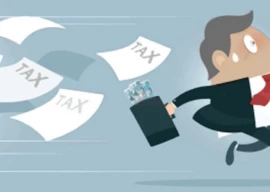
Pakistan faces numerous challenges in its tax system and revenue generation. These challenges include a narrow tax base, a complex tax structure, an undocumented economy, weak enforcement, political instability, and inconsistent policies.
Each government attempts to address these issues according to its own priorities, but the focus remains primarily on increasing taxes from the existing taxpayer base. To address these challenges, including broadening the tax base, the finance minister introduced the Tax Laws (Amendment) Bill, 2024 in the National Assembly. However, again it appears there was little or no consultation with trade bodies, professionals, or taxpayers regarding the proposed amendments before their presentation to the National Assembly.
While the bill is a positive step towards bringing more people into the tax net, certain measures could have a negative impact on the existing taxpayers. Additionally, the preparedness of all relevant stakeholders could influence the successful implementation of these measures once they are enacted.
The proposed amendments under the Income Tax Ordinance, 2001 include a proposal to impose restrictions on economic transactions by certain individuals or entities classified as ineligible persons through the introduction of Section 114C. The primary objective of this proposal appears to be ensuring that anyone engaging in economic transactions has sufficient resources, as declared in their wealth statement (for individuals) or financial statements (for companies or associations of persons) filed for the tax year immediately preceding the transaction year, thereby qualifying them as eligible persons.
Sufficient resources for individuals will be determined by verifying that they possess at least 130% of the cash and cash equivalents declared in their latest wealth statement. For companies or associations of persons, the sufficiency will be based on the cash and cash equivalents declared in the financial statements attached to the latest income tax return. The economic transactions subject to proposed restrictions include the booking, purchase, or registration of motor vehicles; the transfer of immovable property exceeding a specified value; transactions involving securities, such as debt securities or units of mutual funds, as well as the opening or maintenance of accounts for such transactions; opening or maintaining bank accounts other than Asaan accounts; and cash withdrawals exceeding specified limits.
These restrictions, however, come with certain exceptions, such as the purchase of rickshaws, motorcycle rickshaws, or tractors; the purchase of pick-up vehicles with an engine capacity of up to 800cc; investments in securities within specified limits; cases where an ineligible person, after filing their income tax return for the latest completed tax year, submits a statement of sources of investment and expenditure; and transactions by non-resident persons or public companies, except for the restriction on cash withdrawals exceeding specified amounts, etc.
An additional proposal has been made under the ordinance regarding the exchange of banking and tax information related to high-risk individuals. According to the proposed amendment, the Federal Board of Revenue (FBR) may share tax information of high-risk persons, along with data-based algorithms, with scheduled banks.
In turn, the banks are required to provide the FBR with specific details, such as the names and account numbers of individuals whose banking information does not align with the data algorithms provided.
However, it is important to note that the proposal lacks clarity regarding the identification process for high-risk persons or the specific class of individuals for whom this procedure will apply, raising concerns about potential discretionary judgements in its implementation. Instead of focusing on facilitating existing taxpayers and creating additional fiscal space for their businesses, it has been proposed to grant further powers to the FBR under the Sales Tax Act, 1990 to defer or restrict input tax adjustments through an automated risk management system.
This proposal disregards the existing limit of 90% of the output tax for input tax adjustments in situations where such powers would be exercised. However, it is crucial to understand the specific risk parameters that will be integrated into this automated system, as these parameters will serve as the basis for disallowing input tax adjustments beyond the current permissible limit.
It has been proposed to grant commissioners additional powers to restrict the operation of bank accounts or the transfer of immovable property belonging to any person who fails to register under the Act. These restrictions would be enforced by issuing directives to the relevant financial institutions or property registering authorities and would be lifted within two working days of the person's registration. If a person is dissatisfied with the order, an appeal may be filed with the chief commissioner within 30 days.
However, a critical question arises regarding the scope of these powers in the case of individuals: would the restrictions apply exclusively to business-related bank accounts and immovable properties, or would the commissioner have the authority to impose such restrictions on personal bank accounts and immovable properties as well?
It has also been proposed to grant certain powers exclusively to chief commissioners to take coercive actions in cases of non-registration under the Act, with any grievances against such actions being appealable directly to the FBR.
These powers include severe measures such as sealing business premises, seizing movable property, or appointing a receiver to manage the taxable activities of a person.
While these actions are to be taken only after conducting due diligence and providing the individual with an opportunity to be heard, a significant challenge lies in ensuring that these powers are not misused and are exercised strictly as a last resort. Such extreme measures could negatively impact business owners' sentiment and increase resentment against the FBR.
It is important to highlight that under Article 10A of the Constitution of Pakistan, 1973, every person has the right to a free and fair trial, ensuring that civil rights, obligations, or criminal charges are determined through due process. This implies that individuals must be granted the right to appeal to an independent and impartial judicial forum.
However, allowing appeals only to the chief commissioner or the FBR may not fulfill this requirement, as it could lead to biased decisions, causing undue hardship to the affected persons for them not being independent. Additionally, the appeal process should be clearly defined, and these authorities should be obligated to render decisions within a specified timeframe to prevent prolonged suffering. Furthermore, these proposed powers must be assessed in light of Articles 18, 23, and 24 of the Constitution, which guarantee the freedom to engage in trade, business, or profession and the right to acquire, hold, and dispose of property across Pakistan, including the protection of property rights.
The bill also proposes amendments to Sections 26 and 27 of the Federal Excise Act, 2005 with the aim of promoting documentation. Under these proposed changes, the powers of seizure and confiscation of goods subject to the federal excise duty (FED) would be extended to cases involving dutiable goods that either lack the required tax stamps, banderoles, stickers, labels, or barcodes, or have counterfeit ones. These items are mandated under Section 45A to be affixed for monitoring or tracking purposes using electronic or other means. While this is a positive step, it may increase costs for businesses and present enforcement challenges for the FBR.
The proposed amendments are likely to help achieve the desired targets, however, several factors should be considered in advance. These include the readiness of all stakeholders, the additional costs that businesses and administration will incur and the resultant outcome, and the legal complexities that may arise, particularly in relation to the fundamental rights.
It is also important to assess whether the necessary resources are available to implement and enforce these changes. Past experience has shown that many measures have failed to be effectively implemented due to the existing challenges, highlighting the need for careful planning and preparedness.
The writer is a member of the Institute of Chartered Accountants of Pakistan

1734931835-0/Untitled-(81)1734931835-0-405x300.webp)




1734899716-0/image-(15)1734899716-0-270x192.webp)


1734899549-0/image-(16)1734899549-0-270x192.webp)







1734778885-0/Untitled-(10)1734778885-0-270x192.webp)






COMMENTS
Comments are moderated and generally will be posted if they are on-topic and not abusive.
For more information, please see our Comments FAQ